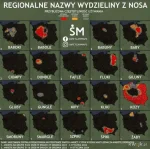Aktywne Wpisy

vikop-ru +99

źródło: FSoeLws3mmLsxplD
Pobierz
Nacho_Libre +13
#sluchamzlastfm #sluchamzlastfm2 #muzyka #spotify #lastfm
Dzień dobry,
W ten niedzielny poranek zapraszam do cotygodniowego Waszego zestawienia najczęściej słuchanych albumów w serwisie last.fm w kończącym się tygodniu.
Słucham z last.fm - Notowanie: 571 - 25 lutego 2024
♪┌|∵|┘
Doskonale wiecie co robić, ale dla przypomnienia ;)
1. Wejść tutaj: http://tapmusic.net/lastfm lub tutaj: http://www.nsfcd.com/lastfm lub https://lastcollage.io/,
2. Wpisać swoją nazwę użytkownika w serwisie last.fm.
3. Następnie wybrać "7 days", gdyż zestawienie będzie z
Dzień dobry,
W ten niedzielny poranek zapraszam do cotygodniowego Waszego zestawienia najczęściej słuchanych albumów w serwisie last.fm w kończącym się tygodniu.
Słucham z last.fm - Notowanie: 571 - 25 lutego 2024
♪┌|∵|┘
Doskonale wiecie co robić, ale dla przypomnienia ;)
1. Wejść tutaj: http://tapmusic.net/lastfm lub tutaj: http://www.nsfcd.com/lastfm lub https://lastcollage.io/,
2. Wpisać swoją nazwę użytkownika w serwisie last.fm.
3. Następnie wybrać "7 days", gdyż zestawienie będzie z





"University of Auckland epidemiologist Simon Thornley discussing the study’s findings. In the video, he says: “The evidence is strongly pointing in the direction of masks NOT being effective in a community setting”. When contacted by AAP FactCheck, Dr Thornley didn’t dispute that the Danish study did not look at whether masks were effective at reducing community transmission. He said there was evidence to support the use of masks, but research that found masks were beneficial was largely from observation studies and not randomised trials.
“Generally, meta-analyses of randomised trials are considered the highest level of evidence,” Dr Thornley said. “To my knowledge, meta-analyses of trials for use of masks to prevent transmission of influenza DO NOT demonstrate benefit of the use of masks.”
He pointed to a meta-analysis, published in the CDC journal Emerging Infectious Diseases in May, that included 10 randomised control trials investigating whether face masks were effective in reducing influenza. The study said it “DID NOT find evidence that surgical-type face masks are effective in reducing laboratory-confirmed influenza transmission, either when worn by infected persons (source control) or by persons in the general community to reduce their susceptibility”."
[1] Source: https://www.aap.com.au/does-a-new-study-show-masks-are-ineffective-at-stopping-covid-19-infection/
[2] Badanie z Danii: https://pubmed.ncbi.nlm.nih.gov/33205991/
[3] Metaanaliza CDC: https://wwwnc.cdc.gov/eid/article/26/5/19-0994_article
#koronawirus #bekazcovidian #zostanwdomu
źródło: comment_1615639026kyX2hoSR4UUhoXzFfvPGt2.jpg
PobierzDoktor Simon Thornley, epidemiolog z Uniwersytetu w Auckland (NZ) mówi na filmie: "Zgromadzony materiał mocno wskazuje na to, że maseczki NIE są skuteczne w warunkach rzeczywistej populacji (pozalaboratoryjnych). Wprawdzie dr Thornley przyznaje, że duńskie badanie nie sprawdzało, na ile maseczki chronią innych i istnieją przesłanki, by zakładać że mogą działać, dodaje jednak że przesłanki te wyprowadzono głównie z badań obserwacyjnych, a nie randomizowanych badań kontrolowanych.
"Generalnie, metaanalizy randomizowanych badań kontrolowanych uważa
¯_(ツ)_/¯